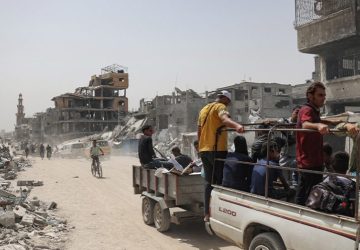The Israeli army asserts its preparedness for “any scenario” after a strike in Beirut killed Hamas’ deputy chief, Saleh al-Arouri, raising concerns of an escalation in the Gaza conflict.
The Israeli army said that it is “prepared for any scenario” after a strike in Beirut that killed Hamas’ deputy chief, Saleh al-Arouri, stoking fears that the war in the Gaza Strip could boil over into a wider regional conflict.
Israeli forces are in a “very high state of readiness in all arenas, in defence and offence. We are highly prepared for any scenario,” declared Israeli army spokesman Daniel Hagariafter the attack. “The most important thing to say tonight is that we are focused and remain focused on the fight against Hamas,” Hagari added.
In this context, Israel’s army said that soldiers in Gaza had killed “dozens of terrorists” during fighting on Tuesday, and had also raided a weapons storage compound in the southern city of Khan Yunis.
In the aftermath of a strike on the Nuseirat refugee camp in central Gaza, Palestinians rushed to rescue victims and retrieve bodies from the rubble.
“There are about 12 martyrs until now, mostly children. What was their fault? Among them my one-month-old son, what did he do to Israel?” asked Ghazi Darwish. “My other son is five years old, he was also martyred.”
Further south in Khan Yunis, the Palestine Red Crescent Society said that Israel had struck its headquarters twice, resulting in “five casualties and three injuries” among displaced people who had sought refuge there and at a nearby hospital.
“They told us to go to the south, which is safe, but they are liars,” shouted Fathi al-Af, pointing to his wounded daughter on a stretcher on the floor of Nasser Hospital after the Red Crescent strike.
‘Unconscionable’ Strikes
The head of the World Health Organization (WHO), Tedros Adhanom Ghebreyesus, denounced the alleged strikes as “unconscionable.”
The strikes in Khan Yunis continued overnight into Wednesday morning, and the Health Ministry in Gaza reported “numerous” deaths.
United Nations agencies have voiced alarm over Gaza’s spiralling humanitarian crisis, which has left 2.4 million people under siege, most of them displaced and crowded into shelters and tents during winter rains.
“Hamas people are hiding in their houses and the tunnels, while we don’t find food or drink and are dying of cold,” said Wojud Kamal al-Shinbary who, like many Gazans, made her way to Rafah, in the far south.
The WHO has warned of the risk of famine and disease, with only a minimal amount of aid entering.
Population Transfer
In this context, Israeli National Security Minister Itamar Ben-Gvir hit back at Israel’s ally, the United States, over its criticism of his push for the transfer of Gazans out of the Palestinian territory.
“The United States is our best friend, but first of all we will do what is best for the State of Israel: the migration of hundreds of thousands from Gaza will allow the (Israeli) residents of the envelope to return home and live in security and will protect the IDF (Israeli) soldiers,” the extreme-right minister posted on X late on Tuesday.
His post comes after the US State Department criticized his call for a population transfer as “inflammatory and irresponsible.”
Washington called out both Ben-Gvir and Finance Minister Bezalel Smotrich, who have called for Israeli settlers to return to Gaza and for the territory’s Palestinian inhabitants to leave.
“Gaza is Palestinian land and will remain Palestinian land,” the State Department said.
Miroslava Salazar, with AFP





